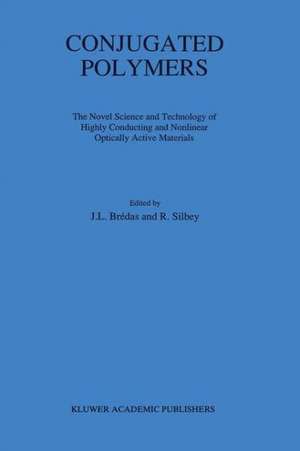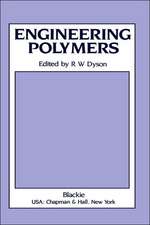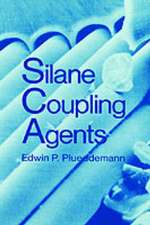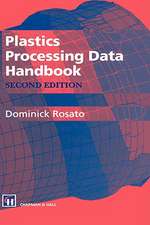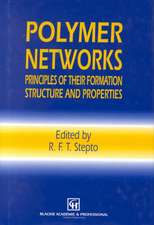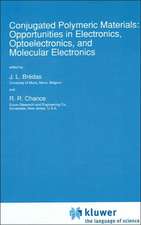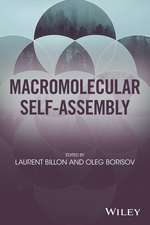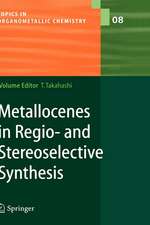Conjugated Polymers: The Novel Science and Technology of Highly Conducting and Nonlinear Optically Active Materials
Editat de J.L. Brédas, R. Silbeyen Limba Engleză Hardback – 30 sep 1991
| Toate formatele și edițiile | Preț | Express |
|---|---|---|
| Paperback (1) | 1233.37 lei 6-8 săpt. | |
| SPRINGER NETHERLANDS – 17 oct 2012 | 1233.37 lei 6-8 săpt. | |
| Hardback (1) | 1075.62 lei 38-44 zile | |
| SPRINGER NETHERLANDS – 30 sep 1991 | 1075.62 lei 38-44 zile |
Preț: 1075.62 lei
Preț vechi: 1415.28 lei
-24% Nou
Puncte Express: 1613
Preț estimativ în valută:
205.88€ • 223.71$ • 173.06£
205.88€ • 223.71$ • 173.06£
Carte tipărită la comandă
Livrare economică 17-23 aprilie
Preluare comenzi: 021 569.72.76
Specificații
ISBN-13: 9780792314035
ISBN-10: 0792314034
Pagini: 624
Ilustrații: XVIII, 624 p.
Dimensiuni: 155 x 235 x 38 mm
Greutate: 1.08 kg
Ediția:1991
Editura: SPRINGER NETHERLANDS
Colecția Springer
Locul publicării:Dordrecht, Netherlands
ISBN-10: 0792314034
Pagini: 624
Ilustrații: XVIII, 624 p.
Dimensiuni: 155 x 235 x 38 mm
Greutate: 1.08 kg
Ediția:1991
Editura: SPRINGER NETHERLANDS
Colecția Springer
Locul publicării:Dordrecht, Netherlands
Public țintă
ResearchCuprins
Conjugated Polymers: The Interplay Between Synthesis, Structure, and Properties.- 1. Introduction.- 2. Structural Features of Conjugated Polymers.- 3. Polymer Synthesis: Basic Methods.- 4. Direct Synthetic Methods.- 5. Polymers from precursors.- 6. Extentions of these Methods in the Synthesis of “Small-Bandgap” Polymers.- 7. Conjugated Polymer Matrices.- 8. Conclusions and Caveats.- Acknowledgements.- References.- Properties of Highly Conducting Polyacetylene.- 1. Introduction.- 2. Sample Synthesis, Morphology and Properties.- 3. Conductivity: Experimental.- 4. Conductivity Measurements: Experimental Results.- 5. Discussion of ?(T).- 6. Morphology and Charge Transport.- 7. Conductivity Barriers and Morphology: a Comparison.- 8. Summary and Outlook.- Acknowledgements.- Literature.- Electronic Properties of Heavily Doped Trans-Polyacetylene.- 1. Introduction.- 2. Models for the Metallic State of Heavily Doped Trans-(CH)x.- 3. Methodology.- 4. Results and Discussion.- 5. Summary and Conclusion.- Acknowledgements.- References.- Solution Processing of Conducting Polymers: Opportunities for Science and Technology.- I. Introduction.- II. Conducting Polymers in Solution.- III. Electrical and Mechanical Properties of Oriented Poly(3-alkylthiophenes) Processed from Solution.- IV. Gels and Blends of the P3AT’s Processed from Solution.- V. Electrical and Mechanical Properties of Polyaniline and Blends of Polyaniline with PPTA Processed from Solution in Sulfuric Acid.- VI. Electrical and Mechanical Properties of PTV and PDMPV.- VII. Mechanical and Electrical Properties of Polyacetylene Films Oriented by Tensile Drawing.- VIII. Correlation between Electrical Conductivity and Mechanical Properties.- IX. Conclusion.- Acknowledgement.- References.- The Polyanilines: Model Systemsfor Diverse Electronic Phenomena.- 1. Introduction.- 2. Leucoemeraldine Base (LEB).- 3. Ring Rotation Polarons and Solitons.- 4. Emeraldine Base.- 5. Pernigraniline Base.- 6. “Metallic” Polyaniline.- 7. Effects of Derivitization.- 8. Summary.- 9. Acknowledgement.- 10. References.- Structural Characterization of Conjugated Polymer Solutions in the Undoped and Doped State.- 1. Introduction.- 2. Polymer Solutions.- References.- 3. Structural Studies with Small Angle Scattering.- References.- 4. Soluble Conjugated Polymers.- References.- 5. Polydiacetylenes.- References.- 6. Study of Dopable Polymers: PANI and Poly-n-Alkylthiophenes.- References.- 7. Does Conjugated Polymer Behave Like Saturated One.- Acknowledgement.- References.- Processable Conducting Poly(3-Alkylthiopenes).- 1. Introduction.- 2. Synthesis.- 3. Characterization.- 4. Processability-polymer Blends.- 5. Electronic Structure and Conformational Excitations.- 6. Doping and Stability.- 7. Transport Properties.- 8. Stretch Orientation of Poly(3-Alkylthiophenes).- 9. Applications.- 10. Conclusions.- Acknowledgements.- References.- Controlled Molecular Assemblies of Electrically Conductive Polymers.- 1. Introduction.- 2. Fabrication of Monolayer and Multilayer Thin Films of Electrically Conductive Polymers.- 3. Molecular and Supermolecular Organizations of LB Films Containing Conducting Polymers.- 4. Electrical Properties of LB Films Containing Conducting Polymers.- 5. Conclusions.- 6. Acknowledgements.- 7. References.- Electronic Properties of Linear Polyenes.- 1. Introduction.- 2. Terms and Concepts.- 3. Overview of Polyene Singlet States.- 4. Interpretative Model.- 5. The Ground State S0 (l1Ag).- 6. The Lowest Energy Excited Singlet State S1 (21Ag).- 7. The Strongly Allowed Excited Singlet State S2(11Bu).- 8. Concluding Remarks.- 9. Acknowledgement.- 10. References.- Vibrational Spectroscopy of Polyconjugated Aromatic Materials with Electrical and Non Linear Optical Properties - A Guided Tour.- 1. Introduction.- 2. Spectroscopy vs. Material Science.- 3. Spectroscopic Observables.- 4. The Vibrational Force Field. Classical vs. Quantum Mechanical Calculations.- 5. Spectroscopic Characteristics Peculiar to Poly-conjugated Materials.- 6. Theoretical Aspects of the Vibrational Spectra of Poly-conjugated Molecules.- 7. Worked-Out Study Cases.- 8. Polypyrrole.- 9. Polythiophene.- 10. Polyalkylthiophenes.- 11. Polyparaphenylene Vinylene.- 12. Conclusions.- Acknowledgement.- References.- Third Order Nonlinear Optical Effects in Conjugated Polymers.- 1. Introduction.- 2. Thin Film Preparation Methods.- 3. Principal x(3) Characterization Techniques.- 4. Frequency Spectrum and Resonance Effects in x(3).- 5. Multiphoton Resonances.- 6. Nonlinear Optical Dichroism.- 7. Perspectives of Applications.- References.- The Semiconductor Device Physics of Polyacetylene.- 1. Introduction.- 2. Electronic Excitations in Conjugated Polymers.- 3. Polymer Processing and Device Fabrication.- 4. Electronic Properties of Durham-Route Polyacetylene.- 5. Schottky Barrier Diodes.- 6. MIS Structures.- 7. MISFET Devices.- 8. General Discussion.- Acknowledgements.- References.
Recenzii
` The book ought to be compulsory reading for anybody proposing to work in the area and should be followed by a short exam before a `practitioners licence' is issued. '
Chemistry & Industry
'This book is a recommended addition to scientific libraries and to scientists interested in remaining abreast of recent advances....' Polymers News 17 1992
Chemistry & Industry
'This book is a recommended addition to scientific libraries and to scientists interested in remaining abreast of recent advances....' Polymers News 17 1992
